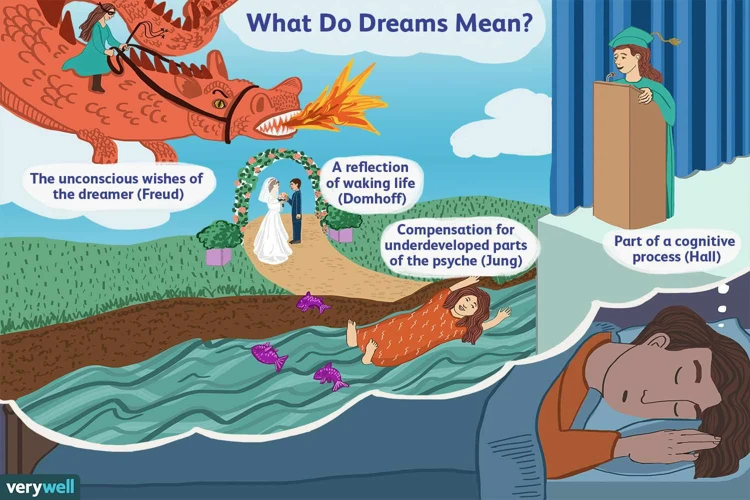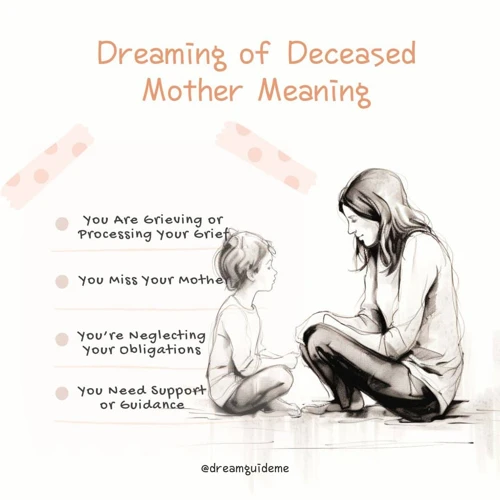Many individuals have experienced vivid and emotionally-charged dreams involving their deceased parents. These dreams can leave us with a sense of confusion, wonder, and longing. What do these dreams mean? Are they just a result of our subconscious mind processing grief and loss, or do they hold deeper symbolic significance? In this article, we will delve into the intricate world of dreams and explore the meaning behind dreaming about deceased parents. By unraveling the symbolism within these dreams, we can gain insight into our emotional state, our unresolved issues, and our deep desires for connection and guidance. Join us on this journey as we explore the depths of the dream realm and seek to understand the messages our deceased parents may be conveying to us.
Understanding Dreams

Dreams have long been a subject of fascination and intrigue, captivating the human mind with their enigmatic nature. Understanding dreams requires delving into the realm of psychology, where dreams are recognized as a window into our subconscious. They serve as a medium through which our mind processes emotions, memories, and experiences. Dreams are filled with a multitude of symbols that hold personal meaning to each individual. These symbols can range from everyday objects to significant figures in our lives. By exploring the significance of dream symbols, we can unravel the hidden messages and gain deeper insights into our inner thoughts and emotions. Whether it’s the depiction of our deceased parents or encountering other symbolic figures like ostriches, brothers-in-law, or a white snake, each dream holds a unique story waiting to be deciphered.
1.1 The Role of Dreams in Psychology
The role of dreams in psychology is multifaceted and holds great significance in understanding the depths of the human mind. In the field of psychology, dreams are seen as a powerful tool for exploring the subconscious. They provide a glimpse into our deepest desires, fears, and unresolved conflicts. Dreams allow us to process and make sense of our emotions, experiences, and memories in a symbolic and metaphorical way. They serve as a platform for problem-solving, creative thinking, and self-reflection. Dreams can be a means of working through past traumas and facilitating psychological healing. With their rich symbolism and hidden meanings, dreams offer valuable insights into our psychological well-being and can be a valuable resource for therapists and individuals seeking self-discovery and personal growth.
1.2 The Significance of Dream Symbols
Dream symbols play a crucial role in understanding the meaning behind our dreams. Each symbol carries its own significance and can hold a multitude of interpretations. Dream symbols can represent repressed emotions, desires, fears, or even serve as messages from the subconscious. It is important to note that the meaning of dream symbols can be highly personal and can vary from person to person. For example, dreaming of water may symbolize emotions or the flow of life for one individual, while for another person it may represent purification and cleansing. To unlock the significance of dream symbols, it is vital to consider the context of the dream, personal experiences, cultural influences, and any emotional attachments linked to the symbol. Keeping a dream journal, where these symbols and their associated emotions are recorded, can aid in recognizing patterns and gaining a deeper understanding of their meaning.
Exploring Dream Symbolism

Dreams are like an intricate tapestry of symbols, each holding its own unique meaning and significance. By exploring dream symbolism, we can unravel the hidden messages and gain a deeper understanding of our dreams. Symbols in dreams can range from people and objects to animals and landscapes, each representing different aspects of our subconscious mind. When it comes to dreaming about parents, they often serve as potent symbols of love, guidance, and emotional connections. Understanding the symbolism of parents in dreams allows us to tap into our own subconscious desires for nurturing, protection, or even resolution of unresolved issues. Additionally, dreaming about deceased parents adds another layer of symbolism as it brings forth themes of grief, loss, and the longing for spiritual connection. By diving into the rich world of dream symbolism, we can embark on a journey of self-discovery and unlock the hidden meanings within our dreams.
2.1 Symbolism of Parents in Dreams
Parents symbolize a significant presence in our lives, representing nurturing, guidance, and support. In the realm of dreams, the symbolism of parents holds a deep-rooted meaning. They often signify our inner desires for security, love, and protection. Dreams involving parents can reflect our relationship with them in waking life, the emotions associated with our upbringing, and the influence they have had on our development. These dreams may also serve as a reflection of our current emotional state and the need for parental figures to provide comfort and assurance. Exploring the symbolism of parents in dreams can offer valuable insights into our subconscious desires and the impact our parents continue to have on our lives.
2.2 Symbolism of Deceased Parents in Dreams
Dreaming about deceased parents carries profound symbolism that goes beyond the ordinary realm of dreams. reveals the significance of these dream encounters. The presence of deceased parents in dreams can represent a variety of emotions, such as grief, longing, or even a desire for closure. It may also symbolize unfinished business or unresolved issues with our parents that continue to affect us. These dreams offer a unique opportunity for introspection and reflection, allowing us to explore our feelings, seek understanding, and find healing in the face of loss.
The Meaning of Dreaming about Deceased Parents

Dreaming about deceased parents can evoke a range of emotions and leave us pondering the meaning behind these experiences. Such dreams may carry profound symbolism, reflecting our ongoing process of grief and loss. They allow us to reflect on the memories, love, and connections we shared with our parents when they were alive. Additionally, dreaming about deceased parents often leads to a reexamination of unresolved issues or unresolved emotions tied to their passing. These dreams may serve as a catalyst for introspection and healing. In some cases, dreaming about deceased parents can also represent a desire for guidance and support. The dream serves as a way for us to seek comfort, wisdom, and reassurance from our parents, even in their absence. It is important to approach these dreams with an open mind and heart, as they offer a unique opportunity for reflection and emotional exploration.
3.1 Reflections on Grief and Loss
When dreaming about deceased parents, one of the key aspects to consider is the reflection on grief and loss. These dreams often serve as a means for individuals to process their emotions surrounding the death of their parents. Within the dream, grief and a sense of loss may be magnified, allowing individuals to confront and release their repressed feelings. It can be a cathartic experience, enabling individuals to express their sadness, longing, and even anger. Dreams provide a safe space to explore these emotions and can aid in the healing process.
3.2 Revisiting Unresolved Issues
In the realm of dreaming about deceased parents, one possible meaning is the revisiting of unresolved issues. These dreams can provide a unique opportunity for introspection and self-reflection, allowing us to confront and address lingering emotions or unfinished business with our departed parents. Symbolic scenarios within the dreams may represent past conflicts, unspoken words, or unresolved emotions that have been left unaddressed. The dream serves as a space for us to delve into these unresolved issues, perhaps offering a chance for closure and healing. It is crucial to pay attention to the emotions and messages conveyed within these dreams, as they can provide valuable insight into our emotional well-being and personal growth.
3.3 Seeking Guidance and Support
When dreaming about deceased parents, one possible interpretation is the desire for guidance and support. These dreams can be a way for our subconscious mind to tap into the wisdom and guidance that we may feel we have lost since the passing of our parents. In these dreams, we may seek advice, answers to pressing questions, or simply a comforting presence. Our deceased parents become a symbol of strength, wisdom, and unconditional love, allowing us to reconnect with their nurturing qualities even in their absence. It is important to pay attention to any messages or insights gained during these dreams, as they may provide guidance and support in navigating our waking lives. Seeking guidance from a therapist or counselor can also be helpful in processing these dreams and finding solace in the emotional connection with our deceased parents.
3.4 A Desire for Reconnection
– The presence of deceased parents in dreams can often reflect a deep desire for reconnection and a longing to be with them once again. These dreams can evoke feelings of warmth, comfort, and nostalgia as individuals yearn for the love and support they once received from their parents.
– The dream scenario may depict moments of intimacy, such as hugging or holding hands, symbolizing a strong emotional connection and a desire for physical closeness.
– For those who have unresolved issues or unfinished conversations with their deceased parents, dreaming of them can be a way of seeking closure and finding peace. It may provide an opportunity to express unspoken words or emotions and alleviate any lingering guilt or regret.
– In some cases, dreaming of deceased parents may also symbolize a need for guidance and support during challenging times. The dream serves as a reminder that even though they are no longer physically present, the wisdom and love of our parents can still guide us in our journey.
– As individuals navigate through different stages of life, dreaming of deceased parents can be a way to revisit cherished memories and relive moments of happiness and security. It allows for a temporary escape from the harsh realities of life and offers solace in the embrace of a familiar and loving presence.
Interpreting Specific Dream Scenarios

Within the vast realm of dreams, specific scenarios can hold profound meaning and provide valuable insights into our subconscious minds. When it comes to dreaming about deceased parents, the interpretation of these dreams is no exception. Interpreting specific dream scenarios involves examining the details and emotions involved in the dream. For example, dreaming of having conversations with deceased parents could signify a desire for their guidance or a need to resolve unresolved issues. Similarly, dreaming of receiving advice or comfort from deceased parents may indicate a longing for their support or reassurance in waking life. Dreams of being reunited with deceased parents can evoke feelings of longing and a deep desire for connection. It is essential to analyze the emotions, symbols, and interactions within these dream scenarios in order to reveal the underlying messages and meanings they hold. By undertaking this exploration, we can gain a deeper understanding of ourselves, our relationships, and the intricacies of our subconscious mind.
4.1 Dreaming of Conversations with Deceased Parents
Dreaming of conversations with deceased parents can be both comforting and perplexing. These types of dreams often indicate a strong desire for closure, guidance, or a need to express unresolved emotions. In these dreams, the conversations may seem vivid and lifelike, as if we are truly engaging with our parents once again. The content of these conversations can vary greatly, ranging from mundane everyday topics to profound and meaningful discussions. It is important to pay attention to the emotions and messages conveyed during these dream interactions, as they can provide valuable insights into our own emotional state and the lessons our deceased parents may still have to impart. These dreams may offer a sense of solace, allowing us to reconnect with our parents and find a sense of closure that may have eluded us in waking life.
4.2 Dreaming of Receiving Advice or Comfort from Deceased Parents
Dreaming of receiving advice or comfort from deceased parents is a common and profoundly meaningful experience. In these dreams, our deceased parents become a source of guidance and support, providing us with wise counsel and solace. These dreams often occur during times of uncertainty or when we are faced with difficult decisions. Receiving advice from our deceased parents in a dream can be seen as an opportunity to tap into their wisdom and draw upon their love and guidance. It is as if they are offering us reassurance and reminding us that they are still with us in spirit. These dreams can bring a sense of peace and comfort, allowing us to feel connected to our parents even though they are no longer physically present.
4.3 Dreaming of Being Reunited with Deceased Parents
Dreaming of being reunited with deceased parents is a powerful and profound experience that can evoke a range of emotions. This type of dream often symbolizes a deep longing for connection, closure, and emotional healing. It may signify a desire to resolve any unresolved issues or unfinished business with our parents. The dream may also represent a need for guidance, support, and reassurance during challenging times in our lives. When we dream of being reunited with our deceased parents, it can offer a sense of comfort, love, and a reminder that they are always with us in spirit. It’s important to reflect on the emotions and messages these dreams convey, allowing ourselves to process grief, seek closure, and find solace in the bond we continue to share with our parents, even beyond their physical presence.
Cultural and Spiritual Perspectives

Cultural and spiritual perspectives play a significant role in understanding the meaning of dreaming about deceased parents. Cultures around the world have unique beliefs surrounding dreams and ancestors. In some cultures, dreaming of deceased parents is seen as a form of communication from the spirit world, where ancestors provide guidance, protection, or warnings. For example, in certain indigenous traditions, dreams are considered a sacred and powerful realm where messages from ancestors are received and interpreted. On the other hand, cultural beliefs differ, and some may view these dreams as mere manifestations of grief or psychological processing. Similarly, from a spiritual standpoint, dreaming about deceased parents can be perceived as a soulful connection or visitation from the afterlife. Seeking comfort, advice, or reconciling unresolved issues are common themes interpreted within the spiritual context. It is fascinating to explore how diverse cultural and spiritual perspectives shape the understanding and significance we attach to these dreams, enriching the tapestry of human experiences collectively.
5.1 Cultural Beliefs Surrounding Dreams and Ancestors
In many cultures around the world, dreams are considered to be deeply connected to the spiritual realm and the realm of ancestors. These cultural beliefs attribute significant importance to dreams involving deceased loved ones, including parents. Here are some intriguing cultural beliefs surrounding dreams and ancestors:
– In Native American cultures, dreaming about deceased ancestors is often seen as a spiritual visitation. It is believed that the ancestors are reaching out with messages, guidance, or warnings for the dreamer.
– In Chinese culture, dreaming about deceased parents is seen as a positive sign. It is believed that these dreams signify the presence of the ancestral spirits, offering protection, guidance, and blessings.
– In African cultures, dreams featuring deceased ancestors are considered powerful and sacred. They are seen as a way for the ancestors to communicate with the living, sharing wisdom, and providing insight into important life decisions.
These cultural beliefs surrounding dreams and ancestors highlight the deep-seated connection between dreams and spirituality in various societies. They emphasize the belief that dreams can serve as a channel for communication with ancestors and the spiritual realm.
5.2 Spiritual Interpretations of Dreams with Deceased Parents
Within the realm of spiritual interpretations, dreams involving deceased parents hold a profound significance. Many spiritual beliefs consider these dreams as a form of communication between the living and the departed. Spiritual interpretations of dreams with deceased parents often view these dreams as a visitation or message from the other side. It is believed that our deceased parents may be attempting to provide guidance, reassurance, or even healing from the afterlife. These dreams may serve as a source of comfort and solace, offering a sense of connection and continued love. Spiritual practices such as prayer, meditation, and rituals can be incorporated to honor and connect with our departed parents within the context of these meaningful dreams.
Tips for Processing These Dreams
Processing dreams involving deceased parents can be a complex and emotional journey. To navigate through the myriad of emotions and insights, here are some tips for processing these dreams:
- Keeping a Dream Journal: Start by recording your dreams in a journal immediately upon waking. Write down as many details as you can remember, including the emotions, symbols, and any notable conversations or experiences. This will help you track patterns and recurring themes over time.
- Seeking Professional Support: If you find it difficult to make sense of your dreams or are overwhelmed by the emotions they evoke, consider seeking the guidance of a therapist or counselor who specializes in dream analysis. They can provide valuable insights and help you navigate through the complex emotions that arise from dreaming about deceased parents.
These strategies can aid in processing these dreams, providing clarity and understanding as you explore the deeper meanings and messages within.
6.1 Keeping a Dream Journal
Keeping a Dream Journal: One effective way to process and gain deeper insights into dreams involving deceased parents is by keeping a dream journal. This simple yet powerful tool allows you to record your dreams immediately upon waking up, capturing every detail and emotion experienced. By consistently jotting down your dreams, you create a repository of symbols, themes, and recurring patterns, which can be analyzed over time. In your dream journal, be sure to include vivid descriptions, emotions felt, and any connections you make to your waking life. Additionally, you can use the journal to reflect on the possible meanings behind your dreams and track any changes or progress in your dream experiences. Whether it’s by using an organized table or a structured list format HTML tags, a dream journal can serve as a valuable resource for understanding and interpreting these profound dreams.
6.2 Seeking Professional Support
Seeking professional support can be beneficial for those who are deeply impacted by dreams about deceased parents. A therapist or counselor specializing in dream analysis or grief counseling can provide guidance and support in navigating the complex emotions that arise from these dreams. They can help individuals process their grief, work through unresolved issues, and explore the deeper meanings behind these dreams. Professional support can also offer tools and strategies to cope with the emotions and thoughts that may be triggered by these dreams. It can be a valuable resource for individuals seeking a deeper understanding of themselves and their relationship with their deceased parents.
Conclusion
In conclusion, dreaming about deceased parents can be a profound and emotionally charged experience. These dreams often symbolize our ongoing connection with our loved ones who have passed away, offering a chance for reflection, healing, and closure. They can serve as a manifestation of our grief, a catalyst for revisiting unresolved issues, or a source of guidance and support. The meaning of these dreams is deeply personal and unique to each individual, influenced by cultural beliefs, spiritual interpretations, and personal experiences. Keeping a dream journal and seeking the assistance of a professional are valuable tools for processing and understanding these dreams. By delving into the symbolic language of our dreams, we can gain valuable insights into our emotions, find solace in our grief, and continue the journey of healing and growth.
Frequently Asked Questions
1. Why do dreams about deceased parents feel so real?
Dreams about deceased parents can feel incredibly real because they tap into our deep emotional connection and longing for our loved ones. Our subconscious mind creates a vivid and immersive experience, allowing us to temporarily feel the presence of our parents once again.
2. Are dreams about deceased parents a form of communication?
Dreams about deceased parents can be seen as a form of communication from the spiritual realm. While dream interpretation is subjective, many believe that these dreams are a way for our loved ones to send us messages, guidance, or reassurance from beyond.
3. What does it mean if I dream about my deceased parents arguing?
Dreams about deceased parents arguing may reflect unresolved conflicts or unhealed wounds from the past. It could be a reminder to address these unresolved issues and find closure in order to move forward in our waking lives.
4. Can dreams about deceased parents bring comfort or closure?
Absolutely. Dreams about deceased parents can provide comfort, closure, and a sense of peace. They may offer an opportunity to say goodbye, receive guidance, or even experience moments of connection that we may have missed in our waking lives.
5. Do dreams about deceased parents indicate unresolved grief?
Dreams about deceased parents can be a reflection of our ongoing grief and the need to process and heal from our loss. They may serve as a reminder to seek support and find healthy ways to cope with our emotions.
6. What if I dream of my deceased parents in a happy and peaceful setting?
A dream of deceased parents in a happy and peaceful setting can signify a sense of resolution, healing, and acceptance. It may indicate that we have found inner peace and have made peace with their passing.
7. Can dreams about deceased parents help us make important life decisions?
While dreams are not a substitute for logical decision-making, they can provide insights and serve as a source of inner wisdom. Dreams about deceased parents may offer guidance, clarity, and perspective on various aspects of our lives.
8. Why do dreams about deceased parents recur?
Recurring dreams about deceased parents often indicate unresolved emotions or issues that require our attention. These dreams persist to remind us of the unresolved matters that need resolution or healing.
9. Are there cultural differences in the interpretation of dreams about deceased parents?
Yes, cultural differences play a significant role in the interpretation of dreams about deceased parents. Various cultures hold specific beliefs and rituals surrounding the afterlife, ancestors, and communication with the deceased, which can influence dream interpretation and meaning.
10. How can I make sense of my dreams about deceased parents?
Keeping a dream journal, reflecting on your emotions and experiences, and seeking the guidance of a professional can aid in making sense of dreams about deceased parents. Exploring the symbolism, personal connections, and underlying emotions will provide valuable insights into the meaning of these dreams.







